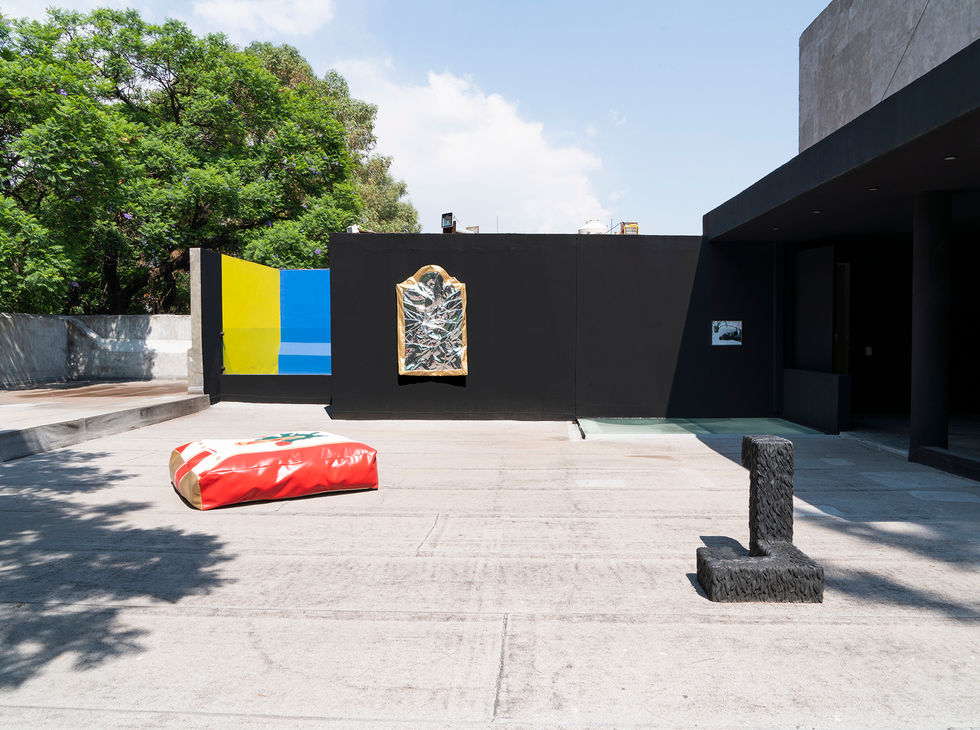UNDER A LOGGIA
Winter Street Gallery is pleased to announce Under a Loggia, an open-air exhibition of eight sculptures and one photograph presented at Galería Hilario Galguera in Mexico City. Featuring new and recent work by Carl D’Alvia, Al Freeman, Tony Matelli, and Kayode Ojo, the exhibition takes a fresh look at contemporary sculpture through the practices of four New York-based artists. Invoking a range of art historical and social references, the works included reveal aspects of humor and the uncanny, and demonstrate strikingly individual attitudes towards visual culture. The title of the exhibition is borrowed from a fictitious novel about a romantic encounter in Italy, which appears in E. M. Forster’s A Room with a View. Curated by Ingrid Lundgren and George Newall of Winter Street Gallery, the exhibition is situated on Galería Hilario Galguera’s Sculpture Terrace from April 27 through July 23, 2021, coinciding with Zonamaco Art Week.
About Galería Hilario Galguera
Galería Hilario Galguera is a contemporary art gallery located in Mexico City. The gallery was founded in 2006 for the discussion of Mexican and international art. The opening exhibition was Damien Hirst’s first solo show in Latin America, titled The Death of God. Since then, the gallery has exhibited works by Daniel Buren, Jannis Kounellis, Peter Buggenhout, Bosco Sodi, and Amy Feldman, amongst others. The gallery artists each have a link to Mexico through an exploration of idea or form, including the mythological documentation, the celebration of life and death, the use of public art, all of which are just examples.
Calle Francisco Pimentel 3, Col. San Rafael, Mexico City | galeriahilariogalguera.com
Dates
April 27 – July 23, 2021
Opening reception: Tuesday, April 27, 4-8 pm
Location
Galería Hilario Galguera
Mexico City
SELECTED WORKS
Carl D'Alvia
In a career spanning two decades, Carl D’Alvia (born 1965, Sleepy Hollow, New York) has frequently drawn on the legacy of minimalist sculpture, at the same time making personal and unexpected assertions about the medium as a whole. A 2017 bronze sculpture entitled Worm indirectly borrows its form and coloration from works by the pioneering American sculptor Tony Smith, known for his striking jet black sculptures rendered in simple geometric compositions. Straying from his initial point of reference, D’Alvia’s surfaces are, at close range, stylized in the manner of the wavy hair of a dog. In line with the artist’s self-proclaimed goal of counteracting the perceived severity of minimalism, the work balances seemingly contradictory impulses within sculpture — on the one hand: seriousness and austerity, and on the other: playfulness and whimsey.


Carl D'Alvia
Worm, 2016
Bronze
27 x 20 x 28 inches
68.58 x 50.8 x 71.12 cm
Al Freeman
Al Freeman (born 1981, Toronto, Canada) makes large-scale soft sculptures depicting quotidian objects such as pencils, soda cans, or a lava lamp, rendering them in malleable tactile materials. Drawing from an endless well of imagery and the further reaches of the internet, Freeman artfully disempowers often male- coded artifacts, finding a formal elegance in the detritus of everyday life. For Under a Loggia, Freeman has created a sequence of brand-new works, immortalizing variously, a shattered mirror and a pack of cigarettes.


Al Freeman
Soft Delicados, 2021
Vinyl and polyfill
49 x 45 x 13 1/2 inches
142.46 x 114.4 x 34.29 cm
Al Freeman
Soft Broken Mirror, 2021
Vinyl and polyfill
60 x 39 3/4 x 2 inches
152.4 x 100.97 x 5.08 cm


Tony Matelli
The sculptures of Tony Matelli (born 1971, Chicago, Illinois) engage themes such as time, banality, and wonder. Confronting their viewer with wide-ranging ideas — from the transience of life to the laws of physics — Matelli’s provocative works raise questions about the fragility of our existence. The two works in the exhibition — Feet (Nectarines) (2020) and Caesar (2018) — come from a series of ‘assisted readymades’, beginning with commercially produced statutes that the artist has scoured and defaced through sandblasting. Referencing iconography from the classical world, Matelli plays with our collective sense of history, providing a tantalizing new perspective on the past.


Tony Matelli
Caesar, 2018
Marble, painted bronze, painted urethane
19 x 59 x 30 inches
48.25 x 149.86 x 76.2 cm
Kayode Ojo
Kayode Ojo (born 1990, Cookeville, Tennessee) brings together lustrous glass, steel, and chains alongside faux crystal, garments and other decontextualized materials to create installations that concern themselves with sourced commercial objects and their seductive properties. Bodily, opulent, and ornamental, Ojo’s sculptures involve materials that activate a particular duality. In the exhibition, champagne glasses are lined up and half-full with uncertain liquids, a pilot suit hangs from the permanent architecture of the space, and a photograph of the artist (posing assuredly towards the viewer) are all, in one reading, suggestive of a half-remembered dinner party, but more poignantly dissect our cultural obsessions with glamor, transience, and the prosaic.

%2C%202018%20(1).jpg)
Kayode Ojo
Studio #1 (Yvonne), 2018
Two archival pigment prints, chrome floor standing sign holder
54 × 14 ×10 inches
137.16 × 35.56 × 25.4 cm

Kayode Ojo
2021
Archival pigment print in chrome frame
33.18 × 40.8 cm
131/16×161/16in
Edition of 3+1 AP












